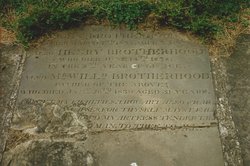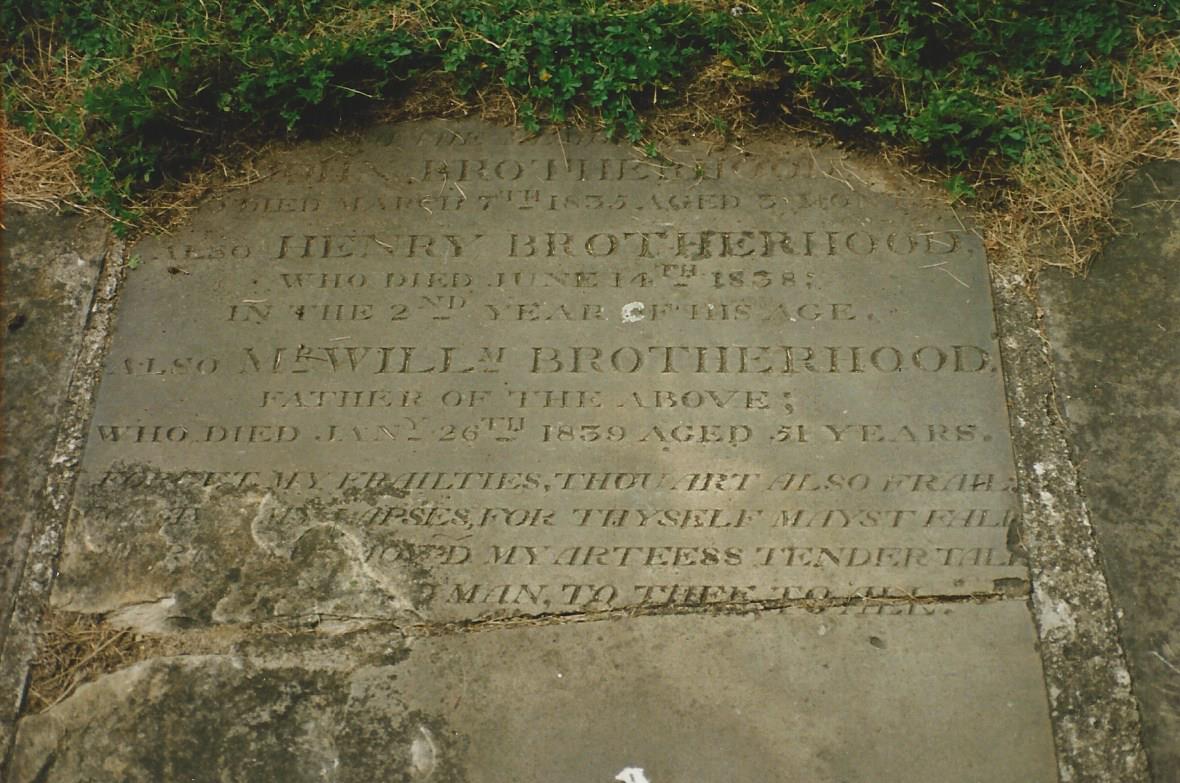According to the memoirs, William "was born in Witton Dean [i.e., Whitton Dene, Middlesex, England] in January 1788 and died at Hounslow [Middlesex] through a fall from his horse January 26th 1839 only 51 years of age. He was rather short but well and strongly built and a very active energetic man. Was the eldest son of a numerous family & put to work at a very tender age, he continued to work with his Father a few years until he went to sea as a servant to a Captain Bowls, after a few years service in which he was at the first taking of Copenhagen by the English, he returned, &, after a short time he settled down again with his Father at their old call [Note: William's father, Harry Brotherhood (1761-1845) , was a woodman who also cut heath turf for fuel, worked at road making, fixing fences, making ditches, planting hedges, harvesting and doing sundry jobs.], and he then added the night soil work which was one of their very best paying jobs. There were no sewers at that time. At the end of the great Comet [Halley] year 1811 he married Charlotte Wilder [1794-1859] when he became a partner with his Father, their business increased very slowly until after the battle of Waterloo. When peace was proclaimed the people began to settle down to business &, instead of war the nobles & gentry also began to improve their grounds & estates so that the Brotherhoods became more noticed & busily employed & as money increased there was a great deal of building commenced which gave them more work in well sinking, digging cesspools etc, as each house had one. There being no water works nor sewers there at that time their business gradualy improved into 1821 & after."
William married Charlotte Wilder on July 15, 1811 in the Parish of West Molesey, Surrey, England . They had 12 children: Rowland (1812-1883); Ann (1814-1846); Leonard (1815-Aft 1841); William (1818-1886); Harriet (1820-1897); Thomas (1822-1883); Emma (1825-1840); Jane (1827-1853); Sally (1829-1880); Joshua (1832-Aft 1902); John (1834-1835); and Henry (1836-1838).
William, Charlotte and their children lived in Whitton Dene, Middlesex. By the time of his death, William's will described this home as being situated in Heath Lane, city of Hounslow, in the parish of Isleworth, County of Middlesex, England. The location of this house is also described in a handbill printed to advertise the sale of the house and the land it was built upon. The handbill states: "Hounslow...Freehold Brick-built Residence, Situate on the North Side of the Road leading from Hounslow to Whitton, Twickenham, &c."
In a March 4, 1905 letter written by Rowland Brotherhood's son, Alfred Brotherhood (1846-1923) to his first cousin, Henry Earl Brotherhood, Sr. (1864-1944), Alfred writes about the handbill, a copy of which Henry must have sent to him: "The Notice of Sale of your grandfather's property at Hounslow England was very interesting. Many a time as a boy have I passed that place and been told that was where my grandfather [William] lived. Of course, that is all changed now built up thick with brick houses and one of the important suburbs of London. I was there in 1893."
Bio submitted by LilyPondLane, #47023500
According to the memoirs, William "was born in Witton Dean [i.e., Whitton Dene, Middlesex, England] in January 1788 and died at Hounslow [Middlesex] through a fall from his horse January 26th 1839 only 51 years of age. He was rather short but well and strongly built and a very active energetic man. Was the eldest son of a numerous family & put to work at a very tender age, he continued to work with his Father a few years until he went to sea as a servant to a Captain Bowls, after a few years service in which he was at the first taking of Copenhagen by the English, he returned, &, after a short time he settled down again with his Father at their old call [Note: William's father, Harry Brotherhood (1761-1845) , was a woodman who also cut heath turf for fuel, worked at road making, fixing fences, making ditches, planting hedges, harvesting and doing sundry jobs.], and he then added the night soil work which was one of their very best paying jobs. There were no sewers at that time. At the end of the great Comet [Halley] year 1811 he married Charlotte Wilder [1794-1859] when he became a partner with his Father, their business increased very slowly until after the battle of Waterloo. When peace was proclaimed the people began to settle down to business &, instead of war the nobles & gentry also began to improve their grounds & estates so that the Brotherhoods became more noticed & busily employed & as money increased there was a great deal of building commenced which gave them more work in well sinking, digging cesspools etc, as each house had one. There being no water works nor sewers there at that time their business gradualy improved into 1821 & after."
William married Charlotte Wilder on July 15, 1811 in the Parish of West Molesey, Surrey, England . They had 12 children: Rowland (1812-1883); Ann (1814-1846); Leonard (1815-Aft 1841); William (1818-1886); Harriet (1820-1897); Thomas (1822-1883); Emma (1825-1840); Jane (1827-1853); Sally (1829-1880); Joshua (1832-Aft 1902); John (1834-1835); and Henry (1836-1838).
William, Charlotte and their children lived in Whitton Dene, Middlesex. By the time of his death, William's will described this home as being situated in Heath Lane, city of Hounslow, in the parish of Isleworth, County of Middlesex, England. The location of this house is also described in a handbill printed to advertise the sale of the house and the land it was built upon. The handbill states: "Hounslow...Freehold Brick-built Residence, Situate on the North Side of the Road leading from Hounslow to Whitton, Twickenham, &c."
In a March 4, 1905 letter written by Rowland Brotherhood's son, Alfred Brotherhood (1846-1923) to his first cousin, Henry Earl Brotherhood, Sr. (1864-1944), Alfred writes about the handbill, a copy of which Henry must have sent to him: "The Notice of Sale of your grandfather's property at Hounslow England was very interesting. Many a time as a boy have I passed that place and been told that was where my grandfather [William] lived. Of course, that is all changed now built up thick with brick houses and one of the important suburbs of London. I was there in 1893."
Bio submitted by LilyPondLane, #47023500
Inscription
Sacred to the memory of
JOHN BROTHERHOOD
who died March 7th 1835 aged 3 months
Also HENRY BROTHERHOOD,
who died June 14th 1838;
in the 2nd year of his age.
Also Mr. WILLm BROTHERHOOD,
Father of the above;
Who died Jany 26th 1839 aged 51 years
Forget my frailties, thou art also frail.
Forgive my lapses, for thyself mayest fall.
[words illegible] mov'd my artless tender tale.
[words illegible] man, to thee, to all.
The verse is from the writings of James Beattie (1735-1803):
Epitaph, Intended For Himself
by James Beattie
1
Escaped the gloom of mortal life, a soul
Here leaves its mouldering tenement of clay,
Safe where no cares their whelming billows roll,
No doubts bewilder, and no hopes betray.
2
Like thee, I once have stemm'd the sea of life;
Like thee, have languish'd after empty joys;
Like thee, have labour'd in the stormy strife;
Been grieved for trifles, and amused with toys.
3
Yet, for a while, 'gainst Passion's threatful blast
Let steady Reason urge the struggling oar;
Shot through the dreary gloom, the morn at last
Gives to thy longing eye the blissful shore.
4
Forget my frailties, thou art also frail;
Forgive my lapses, for thyself mayst fall;
Nor read, unmoved, my artless tender tale,
I was a friend, O man! to thee, to all.
Submitted by LilyPondLane, #47023500
Family Members
-
Elizabeth Ann Brotherhood Briggs
1785–1799
-
Jane Brotherhood
1787 – unknown
-
Henry Brotherhood
1794–1794
-
Mary Ann Brotherhood Benham
1795–1880
-
Charlotte Brotherhood Seal
1798 – unknown
-
Henry John Brotherhood
1801–1801
-
Robert Brotherhood
1802–1847
-
John Brotherwood
1805–1861
-
Joshua Brotherhood
1807–1808
-
Richard Brotherhood
1810–1841
-
![]()
Rowland Brotherhood Sr
1812–1883
-
Ann Brotherhood
1814–1846
-
Leonard Brotherhood
1815 – unknown
-
![]()
William Brotherhood
1818–1886
-
![]()
Harriet Brotherhood Court
1820–1897
-
![]()
Thomas Brotherhood
1822–1883
-
Emma Brotherhood
1825–1840
-
![]()
Jane Brotherhood
1827–1853
-
Sarah "Sally" Brotherhood Vilas
1829–1880
-
Joshua Brotherhood
1832–1902
-
![]()
John Brotherhood
1834–1835
-
![]()
Henry Brotherhood
1836–1838
Advertisement
Advertisement











